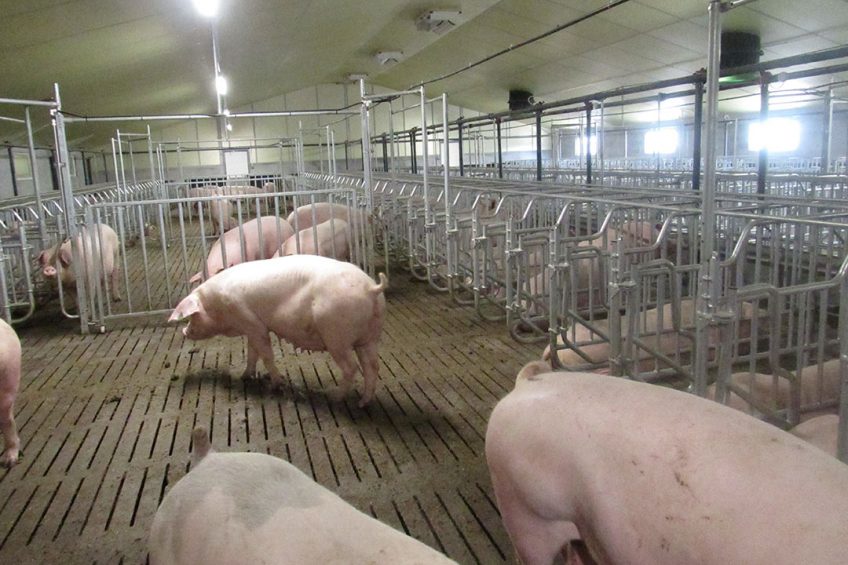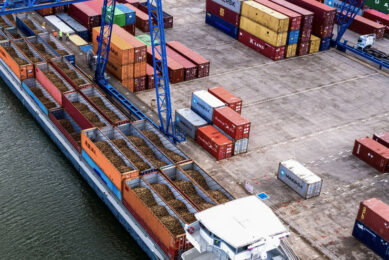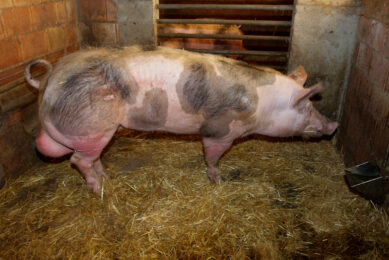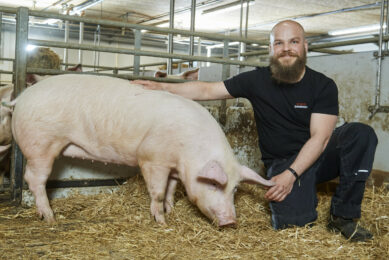A new adventure for a British nucleus

Nucleus Shute farm, located in Cornwall, UK, recently made a remarkable switch: it became the first breeder of Genesus genetics in mainland Britain. Quality, not quantity is what counts for the Shute family.
“We visited Genesus in Manitoba in 2016, we liked the pigs and took on the UK franchise.” That one sentence by Adrian Shute, CEO, concisely captures the recent adventures of the Shute farming business. The Cornwall-based farm decided in recent years to go down a new road in swine production: to become a nucleus breeder for Canadian seed stock supplier Genesus (see box).
A long list of technical results did the trick for Mr Shute. To name a few of a longer list – uniform slaughter pigs, the emphasis on meat quality and not to forget strong, highly prolific and easy to manage sows. Add to that the context of the United Kingdom stepping out of the European Union and the fact that the UK is not performing as well as the neighbours on the continent, and it becomes clear why Mr Shute was keen to have this change.
He continues, “We used to run a nucleus unit for another UK breeding company, so producing breeding stock is nothing new to us. The units are ideally situated as we are in an area with very few pigs, in fact the nearest being 20 miles (32 km, ed.) away from our breeding farms. The initial stock was crossed onto our previous Landrace in the form of Genesus Landrace semen from Glenmarshall Sires (since early in 2016). Then in 2017 it was decided to import gilts and boars from Manitoba.”

A double conversion
As it is mandatory in the European Union to keep sows in group housing for most of the time during gestation phase, the Shute farm converted to Electronic Sow Feeding systems over ten years ago. That system, however, proved not to be optimal, according to the farm owners. Numbers of liveborn piglets tended to be lower than before, Mastitis, Metritis, Agalactia (MMA) problems were observed to be higher with ESF, and timid sows were bullied and needed additional hand feeding.
Hence, now the farm was in transition to a new genetics supplier, the decision was made to convert once more – this time to free access stalls. The French building company I-Tek, located at the other side of the English Channel, helped with the design of the buildings and supply of equipment of the sow facility. Most of the buildings were built and erected by farm staff.

Three-week system
The unit operates on a three-week batching system with the aim being to farrow 100 females per batch, to wean a minimum of 1,200 pigs per batch and for each crate to wean 105 kg of live pigs. Sows and gilts farrow in fully slatted pens equipped with heat pads. Sows are given a prostaglandin injection on the day of farrowing and lamps are also used for the first 24 hours post-farrowing.
Purebred Landrace and F1 Large White/Landrace gilts are grown out on solid floored straw-based pens. These females are fed ad lib high fibre diets to improve gut capacity which helps increase feed intake during lactation. Breeding gilts are sold at 100 kg following selection from the grow-out site. Strong solid boned legs are naturally very important, as is a good underline, with Landrace and F1 gilts having 16 and 14 evenly spaced non-inverted teats respectively.

Mr Shute comments, “Gilts and second parity sows are fed sugar pre-service to boost heat. Sows are inseminated 2/3 way through oestrus at five days post weaning and gilts are taken off Regumate to bring service 24 hours prior to the sow heats which keeps farrowing tight.”
During insemination females are housed in free access stalls through to the fourth week of pregnancy and their pregnancy diagnosis check. “It’s ironic that sows and gilts spend 90% of their time lying in the stalls,” says Tim Clarke, breeding herd production manager. He continued, “Of course they have the choice to walk around or lie on the slats if they so wish.”
Piglets and health situation
Piglets are weighed at birth and again at weaning (27 days) plus are tattooed at two days, with creep being given as a powder initially, followed by pellets. Teeth are not clipped. Post-weaning accommodation is partially slatted, with free access-style long troughs which makes feeding and checking easy.
Veterinary surgeon Dr John Carr is employed by Genesus UK as veterinary adviser for their British units. In his view, the herd is very healthy as it is negative for enzootic pneumonia and PRRS. The farm only vaccinates for parvovirus, Erysipelas, E. coli and PCV2. After showering into the unit the first thing visitors see is a huge whiteboard displaying all the unit data, visible to all staff. Consequently staff are always kept in the loop.

Male piglets destined for slaughter
The male piglets destined for slaughter are moved at weaning to another site, which used to be a dairy facility. That farm was bought in 2015 and converted to a pig farm using in-house labour, with I-Tek and Quality Equipment providing the equipment. The flat deck houses sit on an existing concrete pad which forms the base of the under floor slurry pit. Mr Clarke says, “Why dig up a perfectly sound concrete pad and dig out slurry pits when a much cheaper option is available?”
Bought-in pelleted feed is provided for the nursery pigs to which 3,000 ppm of zinc oxide is added. Mr Clarke says, “This will soon have to be replaced, probably by acids which is no bad thing as zinc makes the feed more unpalatable.”
Profile The Shute family have arable, beef and pig enterprises near Launceston, Cornwall, South West England, which was started in 1972. At the core of the pig business is a 750 sow and gilt Landrace nucleus herd where purebred replacement and Landrace x Yorkshire F1 animals are produced. Pigs not needed for replacements within the nucleus herd are sent off to grow out sites locally; F1 gilts are kept on a small yard straw based system. Feed for the nucleus pigs from 12 kg and over is produced in meal form in the company’s own feed mill, managed by Jeremy Shute. The unit has its own boar stud with semen being collected for specific matings. The Shute family have arable, beef and pig enterprises near Launceston, Cornwall, South West England, which was started in 1972. At the core of the pig business is a 750 sow and gilt Landrace nucleus herd where purebred replacement and Landrace x Yorkshire F1 animals are produced. Pigs not needed for replacements within the nucleus herd are sent off to grow out sites locally; F1 gilts are kept on a small yard straw based system. Feed for the nucleus pigs from 12 kg and over is produced in meal form in the company’s own feed mill, managed by Jeremy Shute. The unit has its own boar stud with semen being collected for specific matings. |
At 12 weeks the pigs are moved in groups of 500 into the part slatted, part solid floored scrape-through finishing pens, which are contained within an airy wide-span building. The animals in all pens are ad lib fed. Finishers are shipped to Tulip in Bristol, killing out at 76.8% giving an average deadweight of 85 kg and a P2 probe of 14.5 mm. “The P2 is high,” states Mr Shute, “but we are breeding females that are robust and that will have a long breeding life in often far from ideal commercial conditions.”
The units all have slurry lagoons plus there is considerable under slat storage. Any surplus slurry is gladly received by neighbouring farmers.
Running a tidy ship
The Shute family ‘runs a tidy ship’. Gilt sales are moving forward with a shipment of F1 animals to be exported, a potential 300 sow restock and regular F1 gilt customers as well as supplying gilts to their own commercial herd. Mr Shute is very keen to point out: “It’s quality, not quantity, that ultimately makes a pig breeding business successful.”
| Genesus makes the jump to UK’s mainland The creation of the Shute nucleus means the effective entrance of Canadian genetics company Genesus to the UK mainland. In Canada, the company is known for its hyperprolificacy. Genesus promotes itself as ‘the 4 tonne sow’, a combination of 30.58 pigs sold per sow x 126 kg/slaughter pig. Genesus maintains three purebred lines: Duroc, Landrace and Large White/Yorkshire and has the largest number of purebred Durocs of any breeding company in the world, as the company pays attention to eating quality. Where the Genesus Landrace nucleus is located in South West Britain, the Large White and Duroc nuclei are to be found in a herd situated in the middle of the UK. Recent batches on the Shute nucleus unit (either purebred or crossbred litters) averaged 15.8 born and 13.8 weaned with an average litter weight of 111 kg. Genesus has had a presence in Northern Ireland for some time, through Glenmarshall Sires, owned by Trevor Shields. |











